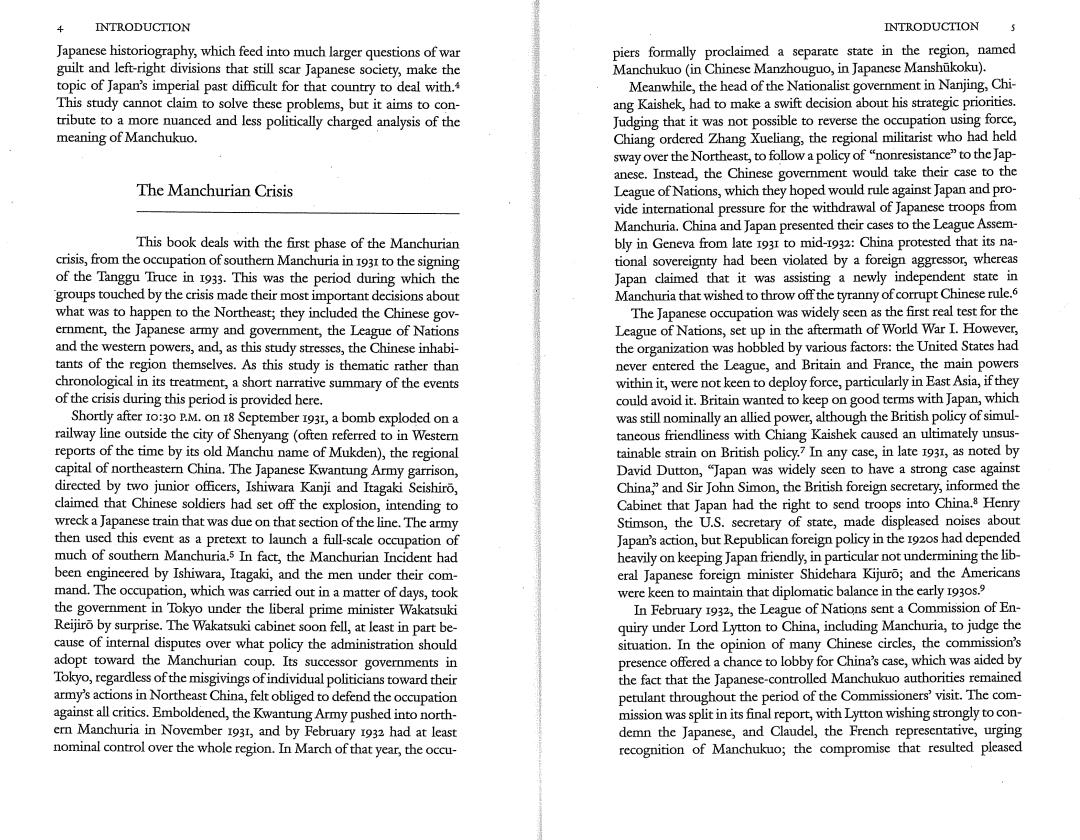正在加载图片...

4 INTRODUCTION INTRODUCTION 5 Japanese historiography,which feed into much larger questions of war piers formally proclaimed a separate state in the region,named guilt and left-right divisions that still scar Japanese society,make the Manchukuo (in Chinese Manzhouguo,in Japanese Manshukoku). topic of Japan's imperial past difficult for that country to deal with. Meanwhile,the head of the Nationalist government in Nanjing,Chi- This study cannot claim to solve these problems,but it aims to con- ang Kaishek,had to make a swift decision about his strategic priorities. tribute to a more nuanced and less politically charged analysis of the Judging that it was not possible to reverse the occupation using force, meaning of Manchukuo. Chiang ordered Zhang Xueliang,the regional militarist who had held sway over the Northeast,to follow a policy of "nonresistance"to the Jap- anese.Instead,the Chinese government would take their case to the The Manchurian Crisis League of Nations,which they hoped would rule against Japan and pro- vide international pressure for the withdrawal of Japanese troops from Manchuria.China and Japan presented their cases to the League Assem- This book deals with the first phase of the Manchurian bly in Geneva from late 193I to mid-1932:China protested that its na- crisis,from the occupation of southern Manchuria in 193I to the signing tional sovereignty had been violated by a foreign aggressor,whereas of the Tanggu Truce in 1933.This was the period during which the Japan claimed that it was assisting a newly independent state in groups touched by the crisis made their most important decisions about Manchuria that wished to throw off the tyranny of corrupt Chinese rule.6 what was to happen to the Northeast;they included the Chinese gov- The Japanese occupation was widely seen as the first real test for the ernment,the Japanese army and government,the League of Nations League of Nations,set up in the aftermath of World War I.However, and the western powers,and,as this study stresses,the Chinese inhabi- the organization was hobbled by various factors:the United States had tants of the region themselves.As this study is thematic rather than never entered the League,and Britain and France,the main powers chronological in its treatment,a short narrative summary of the events within it,were not keen to deploy force,particularly in East Asia,if they of the crisis during this period is provided here. could avoid it.Britain wanted to keep on good terms with Japan,which Shortly after Io:30 P.M.on 18 September 1931,a bomb exploded on a was still nominally an allied power,although the British policy of simul- railway line outside the city of Shenyang (often referred to in Western tancous friendliness with Chiang Kaishek caused an ultimately unsus- reports of the time by its old Manchu name of Mukden),the regional tainable strain on British policy.7 In any case,in late 1931,as noted by capital of northeastern China.The Japanese Kwantung Army garrison, David Dutton,"Japan was widely seen to have a strong case against directed by two junior officers,Ishiwara Kanji and Itagaki Seishiro, China,and Sir John Simon,the British foreign secretary,informed the claimed that Chinese soldiers had set off the explosion,intending to Cabinet that Japan had the right to send troops into China.Henry wreck a Japanese train that was due on that section of the line.The army Stimson,the U.S.secretary of state,made displeased noises about then used this event as a pretext to launch a full-scale occupation of Japan's action,but Republican foreign policy in the I9os had depended much of southern Manchuria.5 In fact,the Manchurian Incident had heavily on keeping Japan friendly,in particular not undermining the lib- been engineered by Ishiwara,Itagaki,and the men under their com- eral Japanese foreign minister Shidchara Kijuro;and the Americans mand.The occupation,which was carried out in a matter of days,took were keen to maintain that diplomatic balance in the early 193os. the government in Tokyo under the liberal prime minister Wakatsuki In February 1932,the League of Nations sent a Commission of En- Reijiro by surprise.The Wakatsuki cabinet soon fell,at least in part be- quiry under Lord Lytton to China,including Manchuria,to judge the cause of internal disputes over what policy the administration should situation.In the opinion of many Chinese circles,the commission's adopt toward the Manchurian coup.Its successor governments in presence offered a chance to lobby for China's case,which was aided by Tokyo,regardless of the misgivings of individual politicians toward their the fact that the Japanese-controlled Manchukuo authorities remained army's actions in Northeast China,felt obliged to defend the occupation petulant throughout the period of the Commissioners'visit.The com- against all critics.Emboldened,the Kwantung Army pushed into north- mission was split in its final report,with Lytton wishing strongly to con- ern Manchuria in November 1931,and by February 1932 had at least demn the Japanese,and Claudel,the French representative,urging nominal control over the whole region.In March of that year,the occu- recognition of Manchukuo;the compromise that resulted pleased